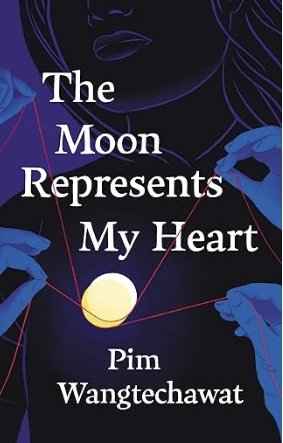The Moon Represents My Heart by Pim Wangtechawat (Blackstone Publishing)
Imagine being born into a family of time travelers and having that gift become yours when you’re still a child. Tommy and Eva are lucky. Unlike their parents, they aren’t made aware of this talent alone, with parents who have no idea that this ability exists outside of storybooks. Joshua and Lily had learned to use their unusual travel skills in secret, until they met each other and slowly divulged their shared truth. When they discover their own children can whisk themselves back in time, they’re delighted and eager to make this a family affair.
Each of them have their own territories. Joshua returns to his childhood home in the Kowloon Walled City. Lily finds herself in England while Tommy is limited to London before 1950. Eva is pulled into the lives of her distant relatives, both dead and living. All of them would agree that time travel carries “a loss waiting to happen.” When that loss comes, their family dissolves forever, leaving Tommy and Eva to carry the weight of their gift alone and unguided.
A scientist and a mathematician, Joshua is reluctant to accept the limitations of time travel that constrain him and his family. Although they can explore the 20th Century from its very beginning, a boundary line separates them from other eras. When he and Lily have fleeting moments in 1899, he embarks upon The Experiment that will fully take them into the 19th Century.
Tommy and Eva wait for their parents on the day of The Experiment, reassuring themselves that an hour’s delay is nothing to fret over. When days have passed and they are still alone, they call Lily’s mother.
Their grandmother never acknowledges the probable death of her daughter and son-in-law, just as she has never welcomed the idea of time travel. To her the vanished parents are simply “gone” and the reason for this is one that she refuses to think about. She forbids her grandchildren to follow the example set by Lily and Joshua and when they do, it becomes a clandestine and shameful activity.
Eva uses her gifts to find a home with the relatives she meets on her secretive excursions into time. Tommy learns his talent carries a way to break hearts, especially his own. Steeped in darkness, he loses his ability to love.
Pim Wangtechawat chose her cumbersome title from the name of a song once made famous by a Hong Kong singer, Teresa Teng. This choice has little to do with her novel, other than a fleeting cameo appearance in the final chapter. Sadly, its amorphous quality is reflected in Wangtechawat’s writing. She frequently lapses into pages of sentences she’s broken into spacing that’s usually found only in poetry. However any poetic touches found here are based in cliches: “soft, golden light,” “a maze of twinkling lights,” “a cold, hardened look in her eyes.”
The Moon Represents My Heart is based on a promising idea that quickly becomes scattered and shapeless. It’s slated to become a series on Netflix, where visual details will supplant the hackneyed images and what seems vague may be sharpened into an intriguing mystery. For now, its story has dissolved as completely as the vanished parents, making it as irksome to read as it is to care about.~Janet Brown
